The trial I was on finished today. I talked about it in my Beyond Reasonable Doubt post, which showed up today but is listed as Oct 17 because that's when I began writing it (I didn't post because I thought there was some chance it violated the judge's admonition to not say anything about the trial, even though it contained none of the facts of the case.)
Now the trial is over so I can talk about it. The only restriction is that I must wait 90 days before taking money for my story. Those of you with the lucrative contracts will just have to wait.
I learned a lot in the trial. I was impressed with the professionalism of the judge and his concern for us, the jurors. I was happy to see they've made the jury process a lot less painful. Still, bring a book, there will be a lot of waiting -- even the juror materials say that.
Our trial was a criminal trial. A woman used fake American Express checks at the EZ 8 motel by Carrows and at Walmart (the old one on the west side of Lancaster). She was charged with two counts of forgery, one count of grand theft and one count of burglary.
The judge and both lawyers wanted us to understand that it would not be like "Law and Order" nor "CSI." ("Shark" also comes to mind, but they didn't mention it.) The evidence was much more bland. It was circumstantial. I thought about detective stories where some direct evidence always pops up at the end to contradict all the circumstantial evidence. Not in the trial. Circumstantial evidence is just as legal and persuasive as direct evidence.
At the end of the prosecution's case I had some doubts. The evidence for what happened in Walmart was not overwhelming. Some of the testimony from the EZ 8 was contradictory. The only fake check in evidence was the one used at the EZ 8 and the American Express expert talked about the check differently than the EZ 8 manager. I thought the defense might exploit some of those holes. However, the defense presented no case! They don't have to -- it's up to the prosecutor to show someone is guilty as the judge repeated reminded us.
The prosecutor gave a very good closing argument. (BTW, the opening statement is not an argument and cannot contain argument. It can only describe the evidence that will be presented.) When she was done I was much more sure of guilt. The key to all the charges was whether the defendant knew the checks were fake. The prosecutor really made it clear why she thought the defendant knew they were fake. Mostly, the defendant had a flimsy story about where she got the checks (some guy named "Marlin", no last name, no contact info). It didn't make sense.
The defense pointed out that the Walmart manager, the EZ 8 manager and clerk all had experience with traveler's checks and all thought the checks looked OK. Even the bank thought the EZ 8 check was OK. It also mentioned that the defendant just stayed at the EZ 8 and didn't try to run away.
That last point was, I thought, the main point in the defendant's favor. Why would she hang around?
However, I thought the defense lawyer made it clearer his client was guilty! How? As I said above, I thought there was some confusion on the facts of what happened. However, the defense lawyer just conceded the events in his argument and focused on whether his client knew the checks were fake. It was the main point, but by letting the other stuff go he helped clarify my thinking. He also made, I believe, an error. He stressed that his client gave her driver's license and other info to the EZ 8. Why would she do that if she knew the checks were fake? However, he mentioned that his client gave a PO Box number. What?? Who gives a PO Box? That's what people do to avoid being found. There was never any other mention of the PO Box except in the defense argument. OOPS! (The prosecutor sealed that argument when she pointed out there was no evidence that the info the defendant gave was correct.)
I was the alternate, so I didn't get in the deliberations. It was kind of frustrating to participate fully in the trial then not get to discuss with the other jurors. On the other hand the judge let me be on call -- I could leave the court house but had to keep my cell phone on and be withing 15-20 minutes of the court. I got to hang out at home while the rest deliberated, so I have no complaints.
Anyway, it took a day and a half to reach a verdict. The decided guilty on all counts. I agreed. I got to talk to some of them afterwards. I was happy with how they all saw things clearly. As one woman said, there was a lot of bullshit presented (by both sides), but the jury saw through it. We weren't just sheep that could be swayed by a clever lawyer. They saw the "Marlin" story as flimsy, just like I did.
I wondered about how the woman staying at the hotel (and not running) would figure in the debate. I noticed she just stayed over the weekend (she passed the first check late Friday night), so the banks wouldn't be open. However, she was arrested on Monday. I wondered why she would stay until Monday. The jury realized this, but noted that the bank probably wouldn't actually clear the check until Tuesday. It was only because the EZ 8 manager was suspicious and called Amex Monday that the fake was discovered so soon. The whole weekend idea was never mentioned during the trial -- the jury saw that on their own.
I liked my jury experience. Being on a jury is kind of a bonding experience. It's pretty cool. Even though I was the alternate and missed the deliberations they still accepted me as part of them. I also got to see a little piece of the legal system. It's far from perfect, but it's generally seems OK.
As a side benefit I learned a couple of other things. First, I now know a lot about what a real Amex check looks like. We saw a real and a fake. I was amazed at how many people with training were fooled. The hologram on the fake was not even close and the printing was very fuzzy.
I also learned that I don't want to be in court. If I am, I want a good lawyer. The prosecutor seemed prepared and organized. She looked at us and made logical arguments. The defense lawyer always read from notes. He repeated himself. He got lost at times. His arguments were at times hard to follow. He made the error I mentioned. He wasn't completely awful, but the prosecutor was better.
Unlike TV, the prosecution case was not all neat and tidy. However, it was good enough. "Beyond a reasonable doubt" is a tough standard but does not require perfection. Even when we have to judge the knowledge of the defendant, as case can be built.
I'd gladly do this again. I'm happy to have served.
Friday, October 26, 2007
Anger, Lust and Sports.
Sarah made an interesting comment on my last blog. She says she's heard that anger is the only acceptable emotion for men in America.
I have two and a half natural emotions: anger, lust and sports. By lust, I mean sexual desire, not lust for power or money or your possessions. Lust is unacceptable in Christian circles. Sports is OK, but is only a half-emotion. So I guess Sarah is right. I have cried in my life, but it is very rare, and even more rare that I can do it in pubic.
When my nephew, Kyle, died my main emotion was anger. According to Kübler-Ross' stages of grief this means I'm still stuck and haven't fully processed my grief. Whatever. I appreciate the help and counseling I've gotten to become more expressive and more familiar with my emotions. However, I'm not going to manufacture emotions just to make others happy.
By contrast, women have 800 gazillion emotions, almost all of which are acceptable. That's OK with me. I'm not angry about it and I don't lust after any of their emotions, especially not PMS. If I'm feeling sporty I may try guessing a women's current emotional state, although it is almost always a dangerous and losing game.
I have two and a half natural emotions: anger, lust and sports. By lust, I mean sexual desire, not lust for power or money or your possessions. Lust is unacceptable in Christian circles. Sports is OK, but is only a half-emotion. So I guess Sarah is right. I have cried in my life, but it is very rare, and even more rare that I can do it in pubic.
When my nephew, Kyle, died my main emotion was anger. According to Kübler-Ross' stages of grief this means I'm still stuck and haven't fully processed my grief. Whatever. I appreciate the help and counseling I've gotten to become more expressive and more familiar with my emotions. However, I'm not going to manufacture emotions just to make others happy.
By contrast, women have 800 gazillion emotions, almost all of which are acceptable. That's OK with me. I'm not angry about it and I don't lust after any of their emotions, especially not PMS. If I'm feeling sporty I may try guessing a women's current emotional state, although it is almost always a dangerous and losing game.
Wednesday, October 24, 2007
Damn It He's Cursing Again
Why do I -- a practicing Christian -- curse?
No, it's not because I want my words remembered, ala George Patton.
I curse because I get angry and want to express it.
I'm old enough that it was wrong to curse when I was a child, even if you weren't a Christian. I became a Christian in junior high and had that belief reinforced. I avoided all bad words. I felt ashamed and embarrassed if someone cursed in my presence.
However, I still got angry. I was shy and tried to hide my anger, but it came out anyway. It came out often in hurtful ways. This kept happening well into my adult life. I hurt those around me with my anger. Most of the time the people I hurt were those closest to me.
I finally came to terms with this. I was suppressing my anger until I finally exploded. To stop suppressing my anger I started recognizing it and dealing with it more. One of the easiest ways to deal with it is to express it. This gets it out in the open where it can be dealt with. Of course, if I express my anger by hurting others I don't really gain anything. So I yell at objects not people. I purposely say how I'm feeling. I have other strategies -- there are many times when yelling and anger expression is bad even if it's not directed at people.
About the same time I learned about how to deal with my anger, I also learned the Bible doesn't really have anything to say about cursing. Taking God's name in vain refers to taking an oath in God's name and then breaking that oath. It has nothing to do with cursing. I find no other biblical prohibition. Cursing helps me be honest about how I feel. I spent so much of my life hiding and holding back. When I suppress curse words I all too often suppress my anger and am dishonest.
I'm not saying it's just OK for me to go ballistic. The standard is to love people and inappropriate yelling is not love. But where possible, I express my anger to avoid suppression, which always ends up being worse.
Best, of course, would be to see life from God's perspective and get rid of ungodly anger. I'm working on that too. I'm very uptight (think Alan on "Two and a Half Men"). I need to learn to relax and trust God.
Now, those of you really paying attention will ask, "But Eric, you curse when you're not mad. Say, for example, your last blog entry." Yes, that's true. Remember I want to be honest. Sometimes I and many other Christians live in such a bubble. It's like if we curse God will break down and cry in shame. Bullshit! God is a big boy. He can handle it (kudos to my friend Don for this insight). I like to break that bubble. To open us up to the real world.
Another problem I've struggled with and still struggle with is pretending to be better than I am. I try to impress people with my righteousness. Cursing stops that tendency dead. Throwing out a couple of f-bombs will instantly remove any comparisons between me and Mother Teresa.
The comic Don McMillan talks about how his dad will pick on him or one of his siblings to pray at holiday meals. Since Don hasn't been to church in a while, he prays under his breath to not be picked. "Please, God, don't let him pick me to say the damn prayer. Damn! I cursed in a prayer, that can't be good. Oh, I did it again!" There was a time when I would have cringed at this. Now I think it's very funny.
Let's all lighten up a bit. Let's all be honest. If you don't like cursing, no problem. But please, don't suppress anger like I did. And don't pretend to be spiritual just because you use fewer adjectives than those around you.
No, it's not because I want my words remembered, ala George Patton.
I curse because I get angry and want to express it.
I'm old enough that it was wrong to curse when I was a child, even if you weren't a Christian. I became a Christian in junior high and had that belief reinforced. I avoided all bad words. I felt ashamed and embarrassed if someone cursed in my presence.
However, I still got angry. I was shy and tried to hide my anger, but it came out anyway. It came out often in hurtful ways. This kept happening well into my adult life. I hurt those around me with my anger. Most of the time the people I hurt were those closest to me.
I finally came to terms with this. I was suppressing my anger until I finally exploded. To stop suppressing my anger I started recognizing it and dealing with it more. One of the easiest ways to deal with it is to express it. This gets it out in the open where it can be dealt with. Of course, if I express my anger by hurting others I don't really gain anything. So I yell at objects not people. I purposely say how I'm feeling. I have other strategies -- there are many times when yelling and anger expression is bad even if it's not directed at people.
About the same time I learned about how to deal with my anger, I also learned the Bible doesn't really have anything to say about cursing. Taking God's name in vain refers to taking an oath in God's name and then breaking that oath. It has nothing to do with cursing. I find no other biblical prohibition. Cursing helps me be honest about how I feel. I spent so much of my life hiding and holding back. When I suppress curse words I all too often suppress my anger and am dishonest.
I'm not saying it's just OK for me to go ballistic. The standard is to love people and inappropriate yelling is not love. But where possible, I express my anger to avoid suppression, which always ends up being worse.
Best, of course, would be to see life from God's perspective and get rid of ungodly anger. I'm working on that too. I'm very uptight (think Alan on "Two and a Half Men"). I need to learn to relax and trust God.
Now, those of you really paying attention will ask, "But Eric, you curse when you're not mad. Say, for example, your last blog entry." Yes, that's true. Remember I want to be honest. Sometimes I and many other Christians live in such a bubble. It's like if we curse God will break down and cry in shame. Bullshit! God is a big boy. He can handle it (kudos to my friend Don for this insight). I like to break that bubble. To open us up to the real world.
Another problem I've struggled with and still struggle with is pretending to be better than I am. I try to impress people with my righteousness. Cursing stops that tendency dead. Throwing out a couple of f-bombs will instantly remove any comparisons between me and Mother Teresa.
The comic Don McMillan talks about how his dad will pick on him or one of his siblings to pray at holiday meals. Since Don hasn't been to church in a while, he prays under his breath to not be picked. "Please, God, don't let him pick me to say the damn prayer. Damn! I cursed in a prayer, that can't be good. Oh, I did it again!" There was a time when I would have cringed at this. Now I think it's very funny.
Let's all lighten up a bit. Let's all be honest. If you don't like cursing, no problem. But please, don't suppress anger like I did. And don't pretend to be spiritual just because you use fewer adjectives than those around you.
Shit Happens
I had a good weekend. The main message I got was. "If think your life is bad, just wait. It will get worse." How is this good? I have a long explanation.
Saturday I went with my friends Robin and Don to the High Desert Baptist Association semi-annual meeting. I didn't expect much: I'm not a big fan of meetings. I thought it would be good to go at least once. I'm treasurer at my church. Even though we are pretty informal that does make me a corporate officer. I also don't know much about Southern Baptists. This is my first Southern Baptist church. Also, I have been trained theologically so I do have some interest in ecclesiastical doings.
The meeting had three main parts. First there were breakout sessions (seminars). Then the main business meeting. Then a repeat of the seminars.
The meeting wasn't bad, but it wasn't that interesting either. I didn't care much for the main speaker. He had that preacher fast-talking-loud-almost-yelling style that I don't like. Nothing really wrong with him, just didn't do much for me. At least the business side of the meeting was efficient. I appreciated that -- why keep us bored longer than necessary. There was some pastoral posturing and backhanded bragging that I've grown used to in Christian circles. Nothing really bad, and most people there seemed pretty cool. Still, I wish we'd quit doing stuff like that.
The seminars, on the other hand, turned out very well. After the main meeting I attended a seminar on how the Southern Baptist cooperative program works. I learned that Southern Baptist Churches are very independent. We don't even have to affirm the SB statement of faith. The SB hierarchy cannot tell churches what to do. Churches join as they wish, believe as they wish and contribute as they wish. I liked that. There is an approval process, so I assumed no real whacked out organizations can join. The main reason for the organization is to cooperate on stuff. The main stuff they cooperate on is missions work. The SBs are very mission minded. I liked that a lot. Very efficient with a clear goal and methodology for helping fulfill the Great Commission. Overall I was very encouraged. I much more proud of being a Southern Baptist and now can more clearly explain what that means.
So far, you're wondering how all this relates to my title. The link is this: Robin gave the first seminar. Now Robin is not shitty or anything. In fact, I love hearing him speak. However, I wasn't going to go to his seminar. Even after I went, Robin asked why I'd gone. I have heard him give the same talk before. I've read his book on the subject. (The unpublished "The Complaint of Jacob," which I highly recommend.) I've heard his ideas many other times. When we got to the meeting Don wanted to go to Robin's talk and I was new and felt like hanging with Don and I do like listening to Robin. So I went and it turned out to be just what I needed.
In Genesis 42 Jacob complains about his life. From his point of view he is right. His life is crap. His wife, Rachael, the love of his life is dead. His favorite son, Joseph, is dead. His family is staving. His sons traveled to Egypt to get food and pissed off the prime minister so badly Simeon is held in jail. This same prime minister now wants his beloved youngest son Benjamin to come to Egypt.
Jacob is absolutely right from his point of view. However, he is absolutely wrong. In reality Joseph is not dead, but is the prime minister of Egypt. God will use him to bless Jacob's family and the world. Life really could not be better.
I needed to hear what Robin said. I whine and get depressed. I needed reminding how much God loves me. How the bad stuff is not my fault. How God will get me through. Even though there is bad in my life, including bad that I've done and bad caused by the bad I've done, God has not given up on me. He loves me and does have a good plan. It probably won't involve wealth and massive success in this life, but God does take care of me. There really is a lot good about my life. I need to quit searching for current comfort and success and being depressed when it doesn't happen. I need to remember that God is in my life and trust him.
Then Sunday, Don preached about almost the same thing. He talked about how Jeremiah complained in Jeremiah 12. God's answer: "If you've run with men and are tired, how will you run with horses?" In other words, "You think this is bad, just wait. It will get worse!" Wow! At first this sounds depressing. However, pause and think for a minute. If it were true that doing good means you will live a wonderful life, then the fact that your life is not all wonderful and successful means you are screwing up. If, on the other hand, it is normal even for good people to suffer, then suffering does not mean we are evil. It does not mean that we are screwing up. In fact the Bible says the godly will suffer.
So many people in our lives, so many preachers in church and on TV, tell us that if we just believe enough or do something better our lives will be wonderful. It is very easy to feel tremendous guilt for our failures. I do it all the time. I need to stop and accept the shit in my life. I need to just trust that God loves me and is leading me in a good direction.
So God thought I needed to hear essentially the same message twice this weekend. As message I've heard many times before and even told others many times before. God was right. I feel much better and more focused.
I am fickle. After my good weekend I got depressed Monday about stuff that happened in court (I'm still on a jury). Tuesday I played racquetball and got depressed about how I played. I forget so quickly. The good news is that in both cases I finally remembered what I'd learned over the weekend and it helped me through.
I had a chance to share some of these thoughts with a friend who had a hard day Monday. I was kind of clumsy, but overnight it jelled into a thought I want to share.
"Despite what parents and other guilt producing entities may say, most of the shit in your life is not there because you are doing something wrong."
A related idea: "There's nothing you can do to remove most of the shit in your life."
Or, as they say, "Shit happens."
I now have a new erenity prayer: "God grant me the serenity to accept the shit I cannot change, the courage to remove the shit I can, and the wisdom to know the difference."
Shit happens to all of us. Don't take it personally. Trust God, know that he loves you and live through the shit.
Saturday I went with my friends Robin and Don to the High Desert Baptist Association semi-annual meeting. I didn't expect much: I'm not a big fan of meetings. I thought it would be good to go at least once. I'm treasurer at my church. Even though we are pretty informal that does make me a corporate officer. I also don't know much about Southern Baptists. This is my first Southern Baptist church. Also, I have been trained theologically so I do have some interest in ecclesiastical doings.
The meeting had three main parts. First there were breakout sessions (seminars). Then the main business meeting. Then a repeat of the seminars.
The meeting wasn't bad, but it wasn't that interesting either. I didn't care much for the main speaker. He had that preacher fast-talking-loud-almost-yelling style that I don't like. Nothing really wrong with him, just didn't do much for me. At least the business side of the meeting was efficient. I appreciated that -- why keep us bored longer than necessary. There was some pastoral posturing and backhanded bragging that I've grown used to in Christian circles. Nothing really bad, and most people there seemed pretty cool. Still, I wish we'd quit doing stuff like that.
The seminars, on the other hand, turned out very well. After the main meeting I attended a seminar on how the Southern Baptist cooperative program works. I learned that Southern Baptist Churches are very independent. We don't even have to affirm the SB statement of faith. The SB hierarchy cannot tell churches what to do. Churches join as they wish, believe as they wish and contribute as they wish. I liked that. There is an approval process, so I assumed no real whacked out organizations can join. The main reason for the organization is to cooperate on stuff. The main stuff they cooperate on is missions work. The SBs are very mission minded. I liked that a lot. Very efficient with a clear goal and methodology for helping fulfill the Great Commission. Overall I was very encouraged. I much more proud of being a Southern Baptist and now can more clearly explain what that means.
So far, you're wondering how all this relates to my title. The link is this: Robin gave the first seminar. Now Robin is not shitty or anything. In fact, I love hearing him speak. However, I wasn't going to go to his seminar. Even after I went, Robin asked why I'd gone. I have heard him give the same talk before. I've read his book on the subject. (The unpublished "The Complaint of Jacob," which I highly recommend.) I've heard his ideas many other times. When we got to the meeting Don wanted to go to Robin's talk and I was new and felt like hanging with Don and I do like listening to Robin. So I went and it turned out to be just what I needed.
In Genesis 42 Jacob complains about his life. From his point of view he is right. His life is crap. His wife, Rachael, the love of his life is dead. His favorite son, Joseph, is dead. His family is staving. His sons traveled to Egypt to get food and pissed off the prime minister so badly Simeon is held in jail. This same prime minister now wants his beloved youngest son Benjamin to come to Egypt.
Jacob is absolutely right from his point of view. However, he is absolutely wrong. In reality Joseph is not dead, but is the prime minister of Egypt. God will use him to bless Jacob's family and the world. Life really could not be better.
I needed to hear what Robin said. I whine and get depressed. I needed reminding how much God loves me. How the bad stuff is not my fault. How God will get me through. Even though there is bad in my life, including bad that I've done and bad caused by the bad I've done, God has not given up on me. He loves me and does have a good plan. It probably won't involve wealth and massive success in this life, but God does take care of me. There really is a lot good about my life. I need to quit searching for current comfort and success and being depressed when it doesn't happen. I need to remember that God is in my life and trust him.
Then Sunday, Don preached about almost the same thing. He talked about how Jeremiah complained in Jeremiah 12. God's answer: "If you've run with men and are tired, how will you run with horses?" In other words, "You think this is bad, just wait. It will get worse!" Wow! At first this sounds depressing. However, pause and think for a minute. If it were true that doing good means you will live a wonderful life, then the fact that your life is not all wonderful and successful means you are screwing up. If, on the other hand, it is normal even for good people to suffer, then suffering does not mean we are evil. It does not mean that we are screwing up. In fact the Bible says the godly will suffer.
So many people in our lives, so many preachers in church and on TV, tell us that if we just believe enough or do something better our lives will be wonderful. It is very easy to feel tremendous guilt for our failures. I do it all the time. I need to stop and accept the shit in my life. I need to just trust that God loves me and is leading me in a good direction.
So God thought I needed to hear essentially the same message twice this weekend. As message I've heard many times before and even told others many times before. God was right. I feel much better and more focused.
I am fickle. After my good weekend I got depressed Monday about stuff that happened in court (I'm still on a jury). Tuesday I played racquetball and got depressed about how I played. I forget so quickly. The good news is that in both cases I finally remembered what I'd learned over the weekend and it helped me through.
I had a chance to share some of these thoughts with a friend who had a hard day Monday. I was kind of clumsy, but overnight it jelled into a thought I want to share.
"Despite what parents and other guilt producing entities may say, most of the shit in your life is not there because you are doing something wrong."
A related idea: "There's nothing you can do to remove most of the shit in your life."
Or, as they say, "Shit happens."
I now have a new erenity prayer: "God grant me the serenity to accept the shit I cannot change, the courage to remove the shit I can, and the wisdom to know the difference."
Shit happens to all of us. Don't take it personally. Trust God, know that he loves you and live through the shit.
Thursday, October 18, 2007
Tech Support
I've never done tech support exactly, but have helped people with computers. This video says it all.
BTW, got this from a friend of long ago, Eric Messelt. He found me on Facebook. More good from the "evil" internet.
BTW, got this from a friend of long ago, Eric Messelt. He found me on Facebook. More good from the "evil" internet.
Wednesday, October 17, 2007
Beyond Reasonable Doubt
I wrote this while I was on the jury for a criminal case. I can't talk about it until it's over. I wasn't supposed to talk about the details of the case while it was going on and thought it better not to post this then, even though it contains none of the facts for the case.
I picked up a couple of ideas from my case that seem interesting.
The first is the idea of making an unbiased or fair decision. In court they want us jurors to be not unduly biased. They recognize that we all have bias, but they want our bias to not hinder us from making a fair decision in our case. The judge has stressed several times that we need to treat every witness as starting at zero. We let the words they say and any related evidence determine how much we believe them. We don't decide how much to believe by how they look or what their lawyer does or because they are a police officer or for any other non-relevant reason.
Our job as jurors is to fairly judge the facts of the case. There is no appeal of a jury's decision. We are the only ones who ever get to decide the facts. Cases can be appealed on points of law, but the jury's fact finding cannot be appealed. In other words, what we jurors decide is final. We need to be careful and do our job well.
In a process called "voir dire," the court asks us questions to get some idea if we will have a problem deciding fairly. They ask if we know anyone in the trail or have any life experience that might prejudice us in the case. They directly ask if we can make an unbiased decision.
As I've said many times that I think one problem many of us have is that we hold opinions so closely we only argue to prove our position. How much better to listen like a juror and decide the facts. As I've learned already in my trial, this is not easy. It is easier to hold to preconceived ideas. As a juror I feel a tremendous duty to listen carefully and not be biased. Shouldn't we all do the same for important issues in our lives?
The case I'm on is a criminal case. In the U. S. people are presumed innocent until proven guilty. Because of this, the defendant is currently not guilty. If I had to vote before any evidence was presented, I'd be obligated to vote "not guilty." It reminds me that in philosophy, disproving one side does not prove the other side. And, by the way, in politics proving your opponent is a scumbag does not prove you are a good candidate.
Another concept is proving "beyond a reasonable doubt." In any criminal case in the U. S., guilt must be proved beyond a reasonable doubt. This is a pretty high standard. It is not enough to have the weight, or preponderance, of the evidence in favor of guilt. There must be no reasonable doubt. It is possible for me to think a person committed the crime, but still have enough doubt that I'd vote not guilty. On the other hand the standard is not "beyond all doubt." I can have some doubt and still vote "guilty."
Very little in life, perhaps nothing, is beyond all doubt. Yet that is often the standard opponents of a position claim the position must adhere to. It's easy to stick our heads in the sand and just believe what we think we know. It's also easy to just say we can't know anything because there are doubts about everything. Much harder, but I believe much better, is to listen to evidence and arguments and make the best decisions we can.
Since I originally wrote this I noticed that Robin had this quote from Larry Niven which sums up nicely what I'm trying to say:
I picked up a couple of ideas from my case that seem interesting.
The first is the idea of making an unbiased or fair decision. In court they want us jurors to be not unduly biased. They recognize that we all have bias, but they want our bias to not hinder us from making a fair decision in our case. The judge has stressed several times that we need to treat every witness as starting at zero. We let the words they say and any related evidence determine how much we believe them. We don't decide how much to believe by how they look or what their lawyer does or because they are a police officer or for any other non-relevant reason.
Our job as jurors is to fairly judge the facts of the case. There is no appeal of a jury's decision. We are the only ones who ever get to decide the facts. Cases can be appealed on points of law, but the jury's fact finding cannot be appealed. In other words, what we jurors decide is final. We need to be careful and do our job well.
In a process called "voir dire," the court asks us questions to get some idea if we will have a problem deciding fairly. They ask if we know anyone in the trail or have any life experience that might prejudice us in the case. They directly ask if we can make an unbiased decision.
As I've said many times that I think one problem many of us have is that we hold opinions so closely we only argue to prove our position. How much better to listen like a juror and decide the facts. As I've learned already in my trial, this is not easy. It is easier to hold to preconceived ideas. As a juror I feel a tremendous duty to listen carefully and not be biased. Shouldn't we all do the same for important issues in our lives?
The case I'm on is a criminal case. In the U. S. people are presumed innocent until proven guilty. Because of this, the defendant is currently not guilty. If I had to vote before any evidence was presented, I'd be obligated to vote "not guilty." It reminds me that in philosophy, disproving one side does not prove the other side. And, by the way, in politics proving your opponent is a scumbag does not prove you are a good candidate.
Another concept is proving "beyond a reasonable doubt." In any criminal case in the U. S., guilt must be proved beyond a reasonable doubt. This is a pretty high standard. It is not enough to have the weight, or preponderance, of the evidence in favor of guilt. There must be no reasonable doubt. It is possible for me to think a person committed the crime, but still have enough doubt that I'd vote not guilty. On the other hand the standard is not "beyond all doubt." I can have some doubt and still vote "guilty."
Very little in life, perhaps nothing, is beyond all doubt. Yet that is often the standard opponents of a position claim the position must adhere to. It's easy to stick our heads in the sand and just believe what we think we know. It's also easy to just say we can't know anything because there are doubts about everything. Much harder, but I believe much better, is to listen to evidence and arguments and make the best decisions we can.
Since I originally wrote this I noticed that Robin had this quote from Larry Niven which sums up nicely what I'm trying to say:
To doubt everything or to believe everything are two equally convenient solutions; both dispense with the necessity of reflection.
Monday, October 08, 2007
Two years gone by.
About two years ago my nephew Kyle died in a motorcycle accident. I blogged about it on MySpace.
Two years later friends are still leaving comments on his profile. The comments are uplifting. Not only that, MySpace seems to have provided those who mourn Kyle with a forum for expressing their thoughts. How cool is that?
Kyle's death was bad and evil -- I still don't understand it. Nonetheless a lot of good came out of it, as I wrote here. I am very glad to see so many good wishes on his MySpace site. I'm tired of hearing how evil this generation is (they said the same about ours) and how the world is falling away from God. Yes, we have problems. But there is also a lot of good. Even on the internet. Thanks to Kyle and his friends for showing us old farts how good people can be.
Two years later friends are still leaving comments on his profile. The comments are uplifting. Not only that, MySpace seems to have provided those who mourn Kyle with a forum for expressing their thoughts. How cool is that?
Kyle's death was bad and evil -- I still don't understand it. Nonetheless a lot of good came out of it, as I wrote here. I am very glad to see so many good wishes on his MySpace site. I'm tired of hearing how evil this generation is (they said the same about ours) and how the world is falling away from God. Yes, we have problems. But there is also a lot of good. Even on the internet. Thanks to Kyle and his friends for showing us old farts how good people can be.
Nerd 2.
In my last post I tried to show the hilarious side of xkcd without going overboard on the nerdy side. Since I got such a good response from both my fans and some questions about levels of nerdiness, I present the following. If you get these, you know you're a nerd.
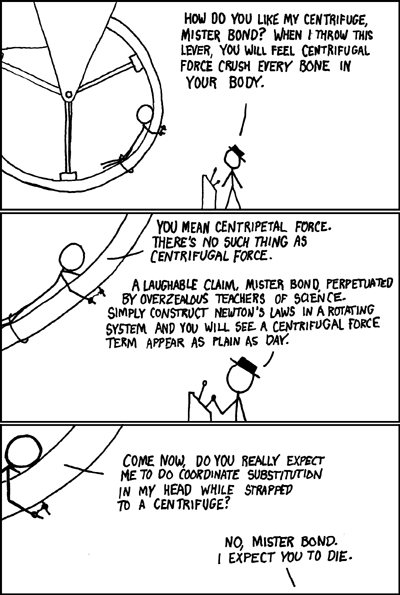
I almost died laughing.
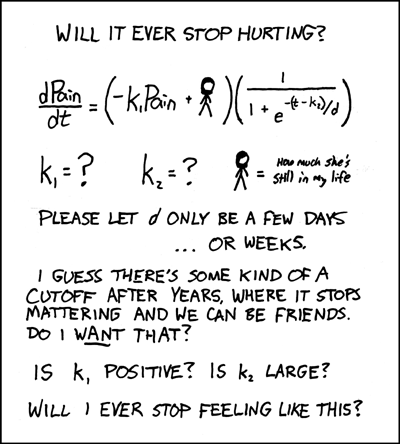
I've actually had thoughts like this.
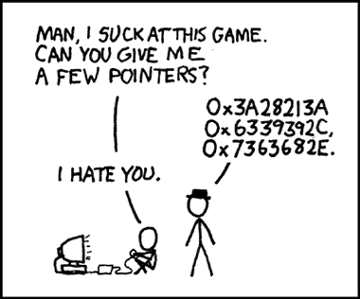
A comic only a programmer could love.
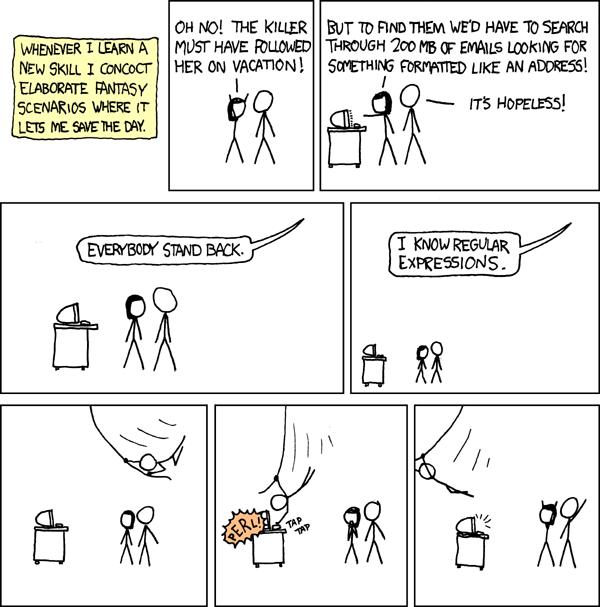
Even at work (where we all write code), I'm the king of shell scripts and regular expressions.

I almost died laughing.

I've actually had thoughts like this.

A comic only a programmer could love.

Even at work (where we all write code), I'm the king of shell scripts and regular expressions.
Friday, October 05, 2007
I am a Nerd
I ran across a very funny web comic strip. It is probably the funniest comic I've ever read.
It's also so nerdy that even my friends and family (except my brother Craig) probably won't get many of the strips.
The comic is xkcd.
Here are a few samples I found hilarious.
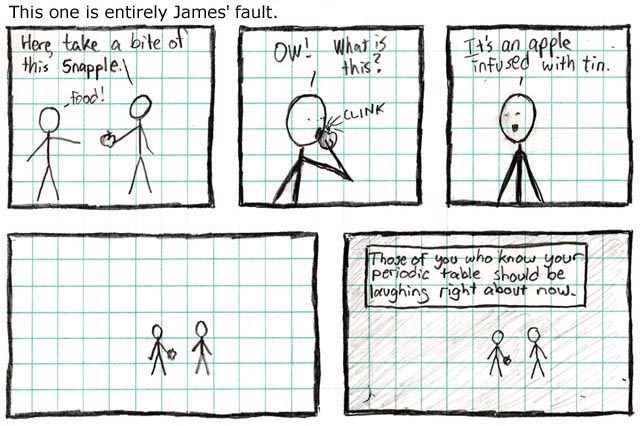
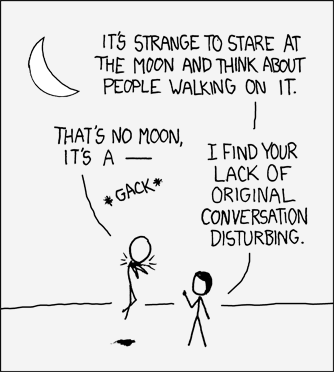
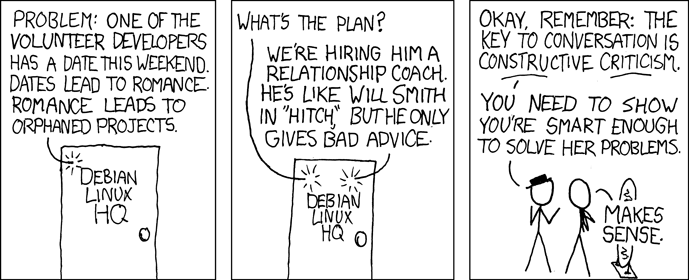
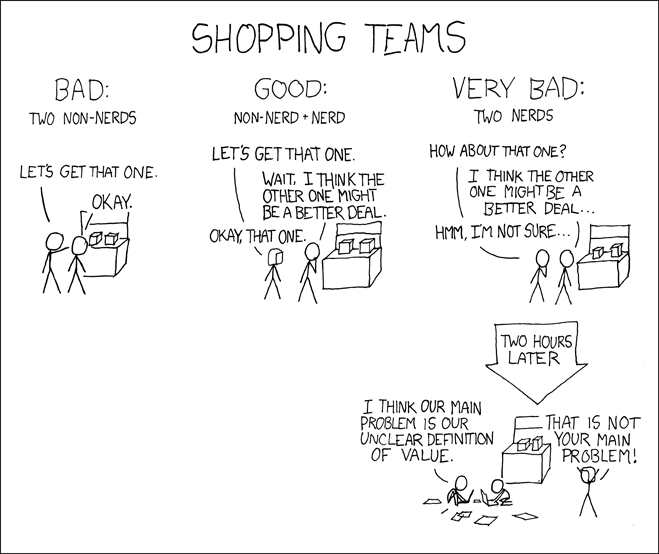
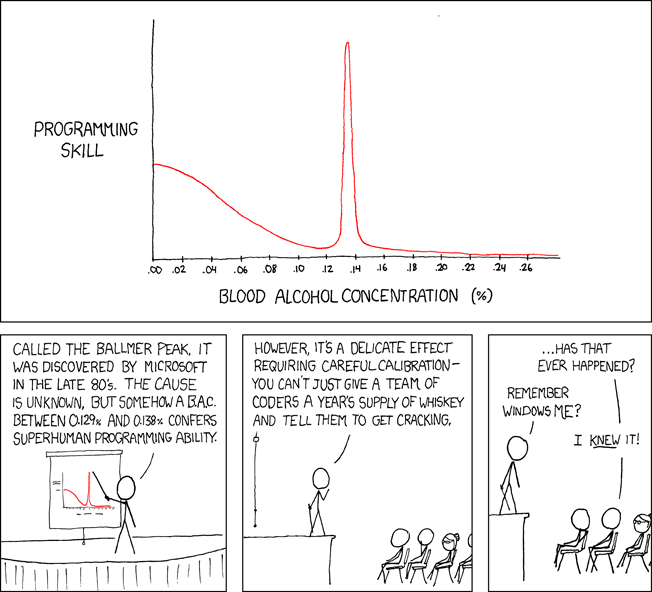
Yes, I'm weird.
It's also so nerdy that even my friends and family (except my brother Craig) probably won't get many of the strips.
The comic is xkcd.
Here are a few samples I found hilarious.





Yes, I'm weird.
Subscribe to:
Comments (Atom)

